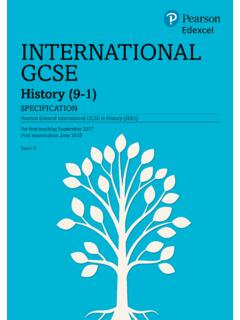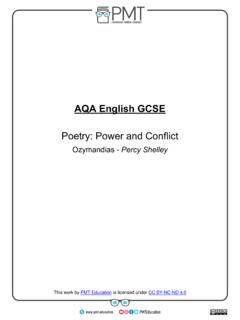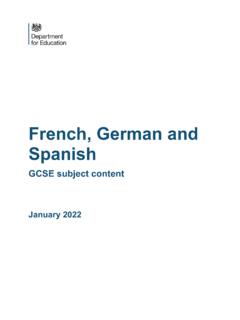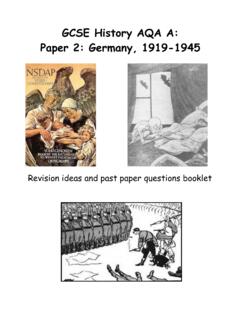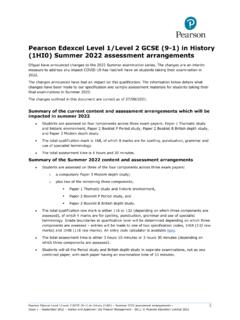Transcription of Citizenship studies: GCSE subject content - GOV.UK
1 Citizenship studies gcse subject content February 2015. Contents The content for Citizenship studies gcse 3. Introduction 3. Aims and learning outcomes 3. subject content 4. Knowledge and understanding 4. Democracy and government 4. Citizen participation in democracy and society 6. Rights, the law and the legal system in England and Wales 6. Identities and diversity in UK society 8. The economy, finance and money 8. Citizenship skills, processes and methods 8. Taking Citizenship action 9. 2. The content for Citizenship studies gcse . Introduction 1.
2 This document sets out the knowledge, understanding and skills common to all gcse specifications in Citizenship studies. Aims and learning outcomes 2. Specifications in gcse Citizenship studies should enable students to deepen their knowledge of democracy and government, the law, rights and responsibilities and how we live together in society. Specifications should enable students to think critically, evaluate evidence, debate ideas, make persuasive arguments and justify their conclusions. Specifications should enable students to acquire the knowledge, understanding and skills to take responsible Citizenship actions, play a positive role in public and democratic life as informed and active citizens, and provide them with the basis for further learning and study.
3 3. gcse specifications should enable students to: know and understand what democracy is, how parliamentary democracy operates within the constituent parts of the UK, how government works and how democratic and non-democratic systems of government are different beyond the UK. know and understand the relationship between the state and citizens, the rights, responsibilities and duties of citizens living and working in the UK and how people participate in democracy know and understand the role of the law in society, how laws are shaped and enforced and how the justice system works in England and Wales know and understand how taxes are raised and spent by governments.
4 And how national economic and financial policies and decisions relate to individuals use and apply knowledge and understanding of key Citizenship ideas and concepts, including democracy, government, justice, equality, rights, responsibilities, participation, community, identity and diversity, to think deeply and critically about a wide range of political, social, economic and ethical issues and questions facing society in local to global contexts use and apply knowledge and understanding as they formulate Citizenship enquiries, explore and research Citizenship issues and actions, analyse and evaluate information and interpret sources of evidence 3.
5 Use and apply Citizenship knowledge and understanding to contribute to debates, show understanding of different viewpoints, make persuasive and reasoned arguments, and justify and substantiate their conclusions use and apply Citizenship knowledge, understanding and skills in order to participate in responsible actions to address Citizenship issues aimed at improving society and positively contributing to democracy and public life, as individuals and in collaboration with others subject content 4. The specifications must build on the knowledge, skills and understanding set out in the content , ensuring progression from national curriculum key stage 3 requirements and the possibilities for progression to a range of A levels and further study.
6 5. Short course gcse Citizenship studies specifications must address half the content specified in the scope of study. The elements from each section of the scope of study that should be addressed in short course specifications are asterisked. Knowledge and understanding Democracy and government Democracy, elections and voting in the UK. the concept of democracy and different forms of democracy, including representative democracy*. the values underpinning democracy: rights, responsibilities, freedoms, equality, rule of law the difference between the executive, the legislature, the judiciary and the Monarchy; the nature of the bicameral Westminster Parliament, the respective roles of and relationship between the House of Commons and the House of Lords, and the role of The Monarch*.
7 The roles of MPs and other key parliamentary roles including speaker, whips, front bench and back bench MPs and ceremonial roles including Black Rod*. how Parliament holds government to account through oversight and scrutiny*. the process of parliamentary debate and deliberation of public issues as part of the process of making and shaping policy and legislation how citizens can contribute to parliamentary democracy and hold those in power to account 4. the major political parties operating in UK general elections and some of their key philosophical differences*.
8 The electoral system based on parliamentary constituencies and the first past the post voting system: how candidates are selected, the frequency of general elections and who can and cannot vote and why*. other types of voting systems used to make decisions in first-past-the-post and proportional systems and the advantages and disadvantages of each National, local, regional and devolved government how national governments are formed by the leader of the political party in power or a coalition of political parties who agree to share power*. the role of the Prime Minister, Cabinet and ministers*.
9 The organisation of government administration into departments, ministries and agencies supported by the Civil Service the nature and organisation of regional and devolved government in the constituent parts of the UK*. how powers are organised between the Westminster Parliament and the devolved administrations in Northern Ireland, Scotland and Wales and how relations are changing between England, Northern Ireland, Scotland and Wales the role and structure of local government in the UK*. British Constitution the institutions of the British constitution: the power of government, the Prime Minister and Cabinet; the sovereignty of Parliament; the roles of the legislature, the Opposition, political parties, The Monarch, citizens, the judiciary, the police and the Civil Service*.
10 How the relationships between the institutions form an uncodified British constitution and examples of how this is changing The role of the media and free press the rights, responsibilities and role of the media and a free press in informing and influencing public opinion, providing a forum for the communication and exchange of ideas and opinions, and in holding those in power to account*. the right of the media to investigate and report on issues of public interest subject to the need for accuracy and respect for people's privacy and dignity*.










